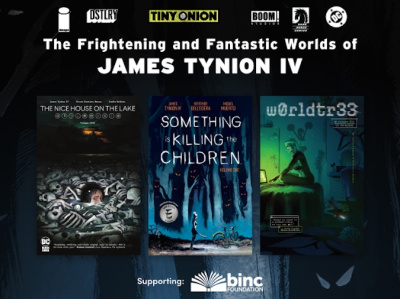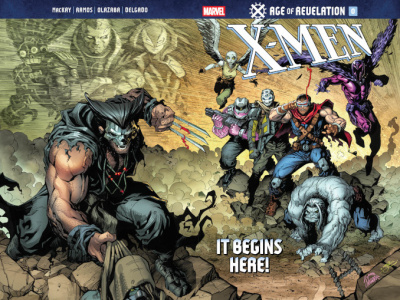Now Comics' Tony Caputo saw the comment by Ian Gould of Ace Comics (see 'Ian Gould of Ace Comics & Games on Marvel Licensing Its Comics') on Caputo's essay on Marvel licensing out its comic publishing operations (see 'Now Comics' Tony Caputo Asks What If?'), and responded:
Several years ago, I was invited to an MIT function where Kenneth Parker, the Director of the Entrepreneurship Program at MIT made a presentation about the pre-2000 entrepreneurship program. In this PowerPoint show he had the unusual acronym: CFIMITYM, explaining that this is the most important acronym they teach their brilliant technology students. It stood for 'Cash Flow Is More Important than Your Mother.'
I have to admit I was aghast that these young, brilliant, impressionable minds believed that all they had to do was sketch out an idea on a napkin, and some venture capitalist would fork over $30 million in start up capital. Who needs cash flow? All companies do, because without cash flow, you're not a company. You're a hobby.
I believe the best of all of Ian's suggestions as to why Marvel didn't succumb to licensing while in bankruptcy is cash flow. Cash flow kept the wheels turning while clearing the paths for other income channels to open and expand. However, before I reiterate some points, please let me first say again that I am not advocating this path, nor is this the 'Caputo Plan.' I'm just enlightening the industry that this may be something that could happen and change the landscape. That's all. This is all speculation. The only way to know Marvel's precise corporate strategy is to participate in the closed door board meetings. What you do know is only what they want you to know.
Ian suggested that publishing is a low-risk, low-cost way to develop new characters, or an 'intellectual property incubator.' While this may be true for DC Comics, owned by Time-Warner, Marvel Enterprises, Inc., is a public company, and not owned by a huge entertainment conglomerate delighted by a low-cost R&D division. This encapsulates my point.
In addition, the 'economies of scale and synergistic benefits' suggesting 'the lowest printing and production costs in the industry' would not be attractive to a board member looking at licensing as an option, because there are no printing and production costs at all in that scenario. If the option was no cost versus lowest possible costs, no cost wins every time. I'm sure as an entrepreneur yourself, Ian, you'd agree.
Yes, you're right that Manhattan real estate isn't cheap, but it is the center of the publishing world, which is one of the synergistic benefits (take it from someone who lives in Chicago, which is happy just being the center of the country). However, if you were not a publisher anymore, that wouldn't matter.
'Highly profitable crossovers' may be more difficult to arrange if the various characters have a home at different companies, but not impossible. I've been at board meetings for a public company, trying to translate the visionary's 'synergistic benefits' and intangible assets to a bunch of suits, and hey, this is what they'd say - '...but not impossible, right?'
Consider this hypothetical conversation between the Publishing Evangelists (PE), and a Board Members (BM):
BM: '...but this option has no costs at all, and we'd generate the same income...?'
PE: 'True, but we're 'The House of Ideas,' we need to continue publishing so we can create new characters...'
BM: 'You don't create new characters, the creators do, don't they?'
PE: 'Er...well, yeah.'
BM: 'If they create the characters in our licensee's books, we'd still own them, right?'
PE: 'Uh, yeah, I guess.'
BM: 'What do you mean, you guess? Do we own them or not?'
PE: 'Yes. Yes, we do.'
BM: 'We didn't have to pay anyone to create them, we own them, and in fact, are actually receiving revenues from the sales of the products? God. I love this country.'
Marvel Enterprises, Inc would deal with small or one-person companies, if the price is right. What, they're going to say no to Frank Miller, Mike Gold, or Les Dabel or Eddie Murphy, Vin Diesel or Madonna, who all decide they want to start a new comic book company? More importantly, let's not forget foreign publishers producing the product first on another continent, before releasing it here. Doesn't India already have the rights to produce their own culturally transformed version of Spider-Man?
At one of my entrepreneurial adventures outside of comic books, an investor once told me that he'd like to fire the President of the company (my friend who hired me), and put me in place as President. He had absolutely no problem with presenting me with this option, because he believed it was in the best interest of the investors. Looking back, I believe this was one of those turning points in my life where I had to make a choice. Should I take the position, and succumb to corporate capitalism, explaining to my friend that 'hey, it's only business,' or should I hold our friendship as more important? How long do friendships last, really? What the hell, right? I found another job and quit within two weeks (forfeiting my stock options). Yes, I've been called an idiot many times, but today I believe in more than just money and power.
You're probably wondering why I'm telling you this story. Well, that investor is now a professor at Harvard Business School.







